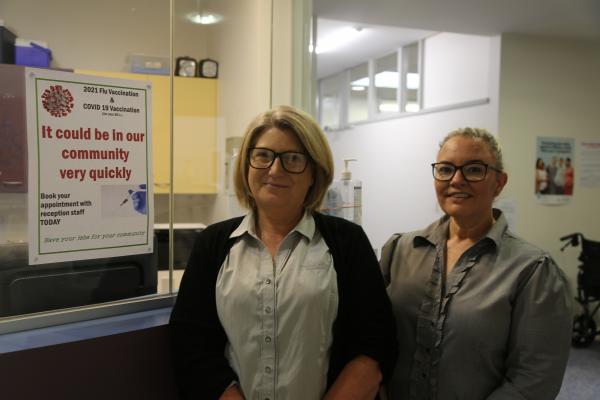By Raquel Mustillo
MILLICENT’s medical professionals have urged residents not to put off getting immunised for coronavirus after observing a spike in vaccine hesitancy among older patients.
The Medical Clinic Millicent, which is the town’s sole clinic, has noted a dramatic reduction in patients aged over 50 following changing regulatory advice and cases of rare blood clots linked to the AstraZeneca vaccine.
Medical Clinic Millicent nurse practitioner Jill Little said just 13pc of residents who are eligible for the AstraZeneca shot have started their two-dose vaccine.
Ms Little said the clinic had previously experienced huge demand for the COVID-19 vaccine, but bookings had plummeted after emerging concerns over the very rare blood clotting syndrome.
“At our peak we did 166 a week and we have the ability to do up to 300 vaccinations each week, but we are probably only getting 60 in,” she said.
“About one third of people don’t want to get it at all, another third want to get the Pfizer vaccine and the rest want to wait to see how the vaccination is rolled out.
“It’s estimated we need around 86pc of people to be immunised for herd immunity and we only have 13pc of the eligible age group vaccinated, which is very low.”
Ms Little said the clinic was now offering a Saturday clinic to accommodate community members who may be unable to access the facility during the week.
“We have moved to a Saturday clinic to capture people who work, but there has not been a lot of take up,” she said.
“The consult is free and it is very quick – it takes 25 minutes total from the assessment to the injection.
“If people want to talk to the doctor about the vaccine and decide they are not ready, they are free to come back another time.”
Ms Little said AstraZeneca was safe for use, with Pfizer preferred for people who have had an anaphylactic reaction to any vaccine in the past, cerebral venous sinus thrombosis or heparin-induced thrombocytopenia.“
The most common side effect we are seeing is a sore arm or possible flu-type symptoms, which usually go away in 48 hours,” she said.
“The risk of getting a blood clot is very, very rare – you are more likely to get struck by lightening.”
Royal Australian College of General Practitioners president Dr Karen Price said vaccines, like all medicines in Australia, are assessed by the Therapeutic Goods Administration to ensure they are safe for use. “
As we speak, new COVID-19 cases have emerged in Victoria and we simply do not know if and when more outbreaks will occur. “
So please, get vaccinated as soon as you can because we all have a role in combating this pandemic.”
Dr Price urged individuals who were planning to avoid receiving AstraZeneca and wait until another vaccine was available not to wait.
Australian Medical Association SA president Dr Michelle Atchison said vaccinated individuals were still able to contract COVID-19, but less likely to experience serious symptoms and hospitalisation.
“If you are vaccinated and you get COVID, you are likely to have a serious type of illness and are very unlikely to require intensive care,” she said.“
If you are not vaccinated, you run the risk of requiring a ventilator or having high intensity care and the reality is that in an outbreak, the regions can’t manage that. “
We recognise there is a very small chance of serious side effects, but it is a safe vaccine and we encourage people to take it.”
Member for Barker Tony Pasin said health advice clearly recommended Australians over the age of 50 should take the AstraZeneca vaccine.
“I encourage all eligible Australians to take the vaccine and in doing so you are not only protecting yourself, but you are also protecting the broader community from this highly infectious disease,” he said.








